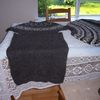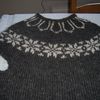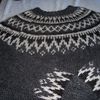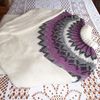Ashley X
9.10.2007 | 13:09
Hérna kemur meira um þessa stúlku sem ég var að skrifa um hér í fyrri færslu. Það voru heilmiklar umræður um þetta mál í fyrra...þið verðið að vísu að geta lesið á ensku, ég nenni ekki að snara þessu á íslensku.
Background
Ashley was born with a severe brain impairment of unknown cause, termed a "static encephalopathy" because it has not worsened. Although she sleeps and awakens, and breathes on her own, she is unable to raise her head, sit up, hold a toy, walk, or talk, and must be tube-fed. Nonetheless, she is alert and responsive to her environment, particularly enjoying the music of Andrea Bocelli. Her parents have nicknamed Ashley "Pillow Angel," because she always remains where she is placed, which is usually on a pillow.[1]
In 2004 when Ashley was six and a half years old, she began to show signs of puberty[1] and her parents and doctors began to anticipate a variety of issues common in children with severe neurological impairments. As these children grow larger, it takes more strength to move them and provide basic bodily care, raising the risk of pressure sores from immobility. Precocious puberty is common in children with various forms of severe brain damage. The early appearance of secondary sexual characteristics is often distressing to parents and caretakers. Many parents of severely disabled children explore possible ways to avoid having to deal with menstruation and fertility in a diapered child. A variety of treatments have been used over the last several decades to deal with these issues.
In July 2004, Ashley had a hysterectomy (to prevent menstruation) and surgical removal of her nascent breast buds (to prevent development). She also underwent an appendectomy. The surgery was performed at Seattle's Children's Hospital and Regional Medical Center. In addition, she recently completed estrogen therapy to permanently stunt her growth.
Ashley's story first broke in October 2006, in the Archives of Pediatrics & Adolescent Medicine. In January 2007, her parents, who wish to remain anonymous, set up a blog to explain their reasoning for their decision.[1]
[edit] Arguments for the treatment
The parents state that they sought such treatment for the best interests of their daughter, namely, to enable them to personally continue constant care for her; to reduce the risk of bedsores; to avoid the discomfort that may be associated with menstruation; to prevent pregnancy; to avoid the discomfort of large breasts, which run in Ashley's family; to prevent breast cancer; to prevent appendicitis which occurs in 5% of the population and which would be difficult to diagnose in Ashley as she would be unable to communicate the symptoms. They also believe that without developing secondary sexual characteristics, Ashley will be less vulnerable to sexual abuse.[1]
[edit] Reactions
In the United States, Arthur Caplan, of the University of Pennsylvania's Center for Bioethics, has criticized the Ashley Treatment in an MSNBC editorial, arguing that it is "a pharmacological solution for a social failure--the fact that American society does not do what it should to help severely disabled children and their families."[2]
Disability rights advocates, including Not Dead Yet[3] and Feminist Response in Disability Activism (FRIDA), called the treatment "invasive medical experimentation", "mutilation", "desexualization", and a violation of Ashley's human rights. FRIDA called on the American Medical Association to condemn the Ashley Treatment [4]
In the United Kingdom, the British Medical Association stated, "If a similar case occurred in the UK, we believe it would go to court and whatever decision was ruled would be in the best interests of the child." Dr. Peter Hindmarsh, Professor of Paediatric Endocrinology at Great Ormond Street Hospital was troubled by the treatment decision being taken by a hospital ethics committee. "'I am not sure the ethics committee was the right place to decide,' he said, adding that it was not clear who represented the child's interests when it went before the committee." [5]
In Canada ethicist Arthur Schafer's nationwide opinion piece[6] defending the operation as justifiable in consideration of Ashley's comfort served as a catalyst for criticism from disability rights activists such as Dave Hingsburger[7] of the York Central Hospital and Keenan Wellar from the LiveWorkPlay self-advocacy organization. In a rebuttal,[8] Wellar attacked the notion that Ashley's limited mental abilities justified the decisions made on her behalf: "Infants have human rights even though they can't speak for themselves. Why should Ashley have received any less consideration?"
On May 8, 2007, an investigative report, done by The Washington Protection and Advocacy System, criticized the hospital that performed this controversial procedure for violating Washington State law. [9]








Athugasemdir
Cut her to peaces and put her away. þvílkt og annað eins ég er orðlaus.
Ásdís Sigurðardóttir, 9.10.2007 kl. 13:21
Ég fylgdist með þessu máli og mér er enn óglatt. Skelfileg mannfyrirlitning og tilfinningakuldi.
Jenný Anna Baldursdóttir, 9.10.2007 kl. 13:32
Já, ég man eftir þessu núna. Þeir tóku ekki beint af henni brjóstin heldur þann hluta sem breytist við kynþroska. Þau stöðvuðu einnig vöxt hennar svo hún mundi hætta að stækka. Þannig að mamma hennar gæti ennþá lyft henni og séð betur um hana. Ég sá heimildar mynd um þetta á Sky og maður lítur öðruvísi á þetta þegar maður sér ástandið. Ég skil foreldra hennar vel og fær stúlkan betri umönnun í framtíðinni.
Halla Rut , 9.10.2007 kl. 13:46
Já Halla, hún er náttlega afar mikið fötluð og getur sig alls ekki hreyft. En samkvæmt því sem kemur fram neðst í þessu sem ég póstaði þá virðist sjúkrahúsið hafa verið vítt fyrir að framkvæma þessa aðgerð. Hún hafi brotið í bága við lög.
Ragnheiður , 9.10.2007 kl. 13:58
Sjónarmið foreldranna er skiljanlegt, því það er örugglega alltaf sárt fyrir foreldra að þurfa að koma barni sínu fyrir á stofnun, sem óhjákvæmilega hlýtur að koma að ef/þegar barnið vex foreldrum sínum "yfir höfuð" (svo að segja). Og vafalaust erfitt að finna jafn frábærar stofnanir þarna vestra eins og við höfum hér á landi, þar sem umönnun þessara einstaklinga er örugglega með því besta sem gerist.
Þetta er auðvitað rosalega mikið inngrip í líkamsstarfsemi stúlkunnar, að halda henni á bernskustigi í líkamlegum þroska, sama þroska og hún hefði komið til að búa við andlega, hvort sem aðgerðin var framkvæmd eða ekki. Vekur upp erfiðar spurningar, siðferðilega og félagslega. Mér sýnist samt aðaládeilan felast í því hver tók ákvörðunina um aðgerðirnar, að siðgæðisnefnd sjúkrahússins skyldi axla þá ábyrgð, í stað þess að leitað væri til dómsstóla um úrskurð. En slík málaumleitan hefði vitanlega getað tekið mörg ár, og á meðan hefði stúlkan vaxið...
Ég segi eins og Halla Rut, þó ég hafi ekki séð myndina um þetta, að sjónarmið foreldranna er skiljanlegt og kannski réttlætanlegt. Það er ósköp auðvelt að setjast í dómarasæti og dæma þetta forkastanlegt þegar maður hefur ekki verið í þessum aðstæðum sjálfur.
Greta Björg Úlfsdóttir, 9.10.2007 kl. 16:31
Nei ,ég treysti mér ekki til að dæma þetta. Mér finnst samt ágætt að geta hugsað um mál eins og þessi og velt fyrir mér. Sérstaklega mál sem eru utan míns reynsluheims eins og þetta er. Spurningin hlýtur samt alltaf að snúast að réttindum barnsins þegar upp er staðið. Við svona mikla fötlun má leiða að því líkum að kynþroski sé til trafala en hvar eiga þá mörkin að vera? Úrskurða í hverju máli ?
Ragnheiður , 9.10.2007 kl. 16:36
Hér fyrir um 50 árum þá fóru foreldrarnir með vanheilu börnin á Fávitahæli Ríkisins........í Kópavogi. (Þetta bara hljómar eins og teksti Marteins Mosdal) og skildu þau þar eftir. Viðhorf samtímans réði,og á skilti á túninu stóð.Fávitahæli Ríkisins,þeir sem fara hér inn gera það á sína ábyrgð.!
Margrét Sig (IP-tala skráð) 14.10.2007 kl. 14:27
Bæta við athugasemd [Innskráning]
Ekki er lengur hægt að skrifa athugasemdir við færsluna, þar sem tímamörk á athugasemdir eru liðin.